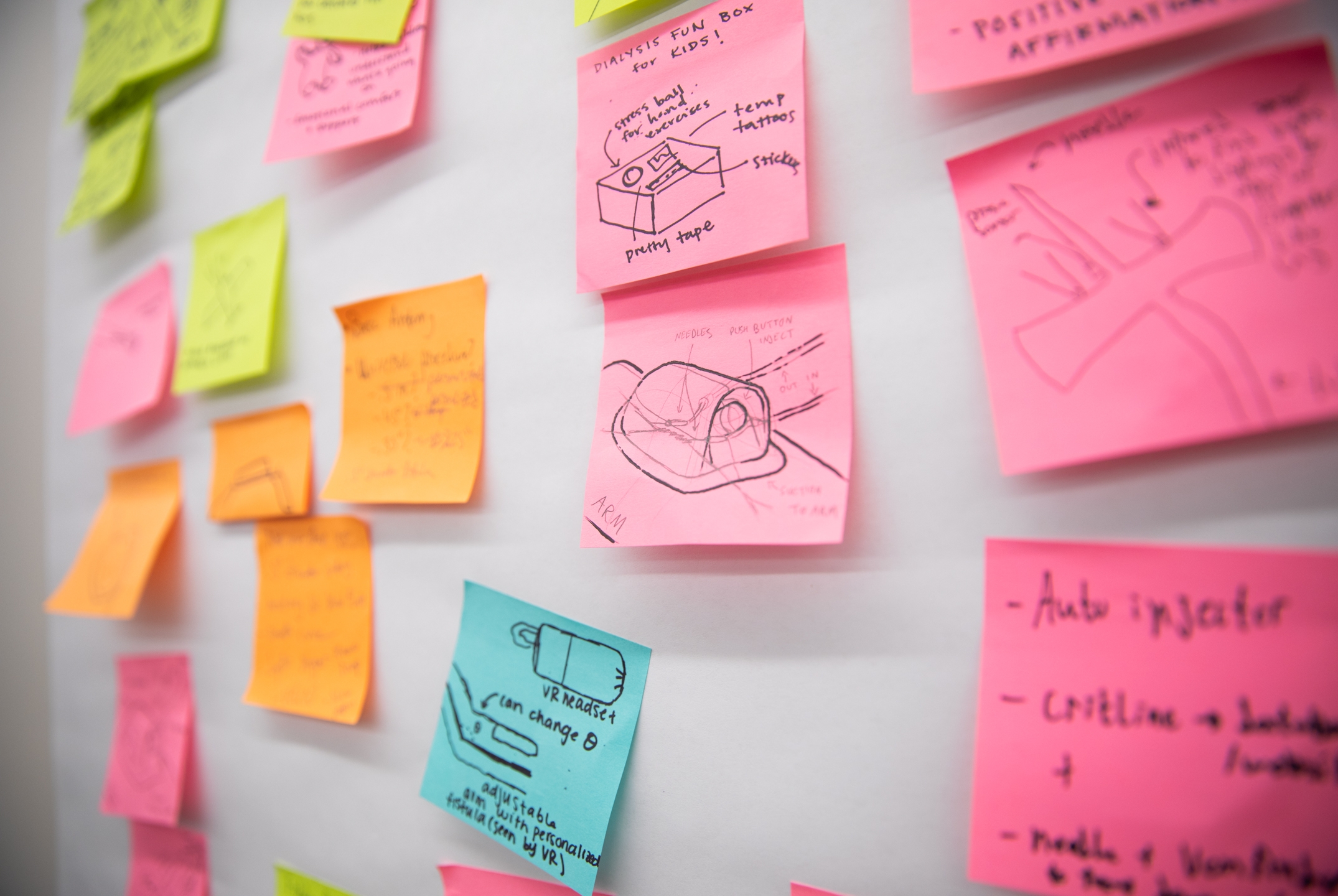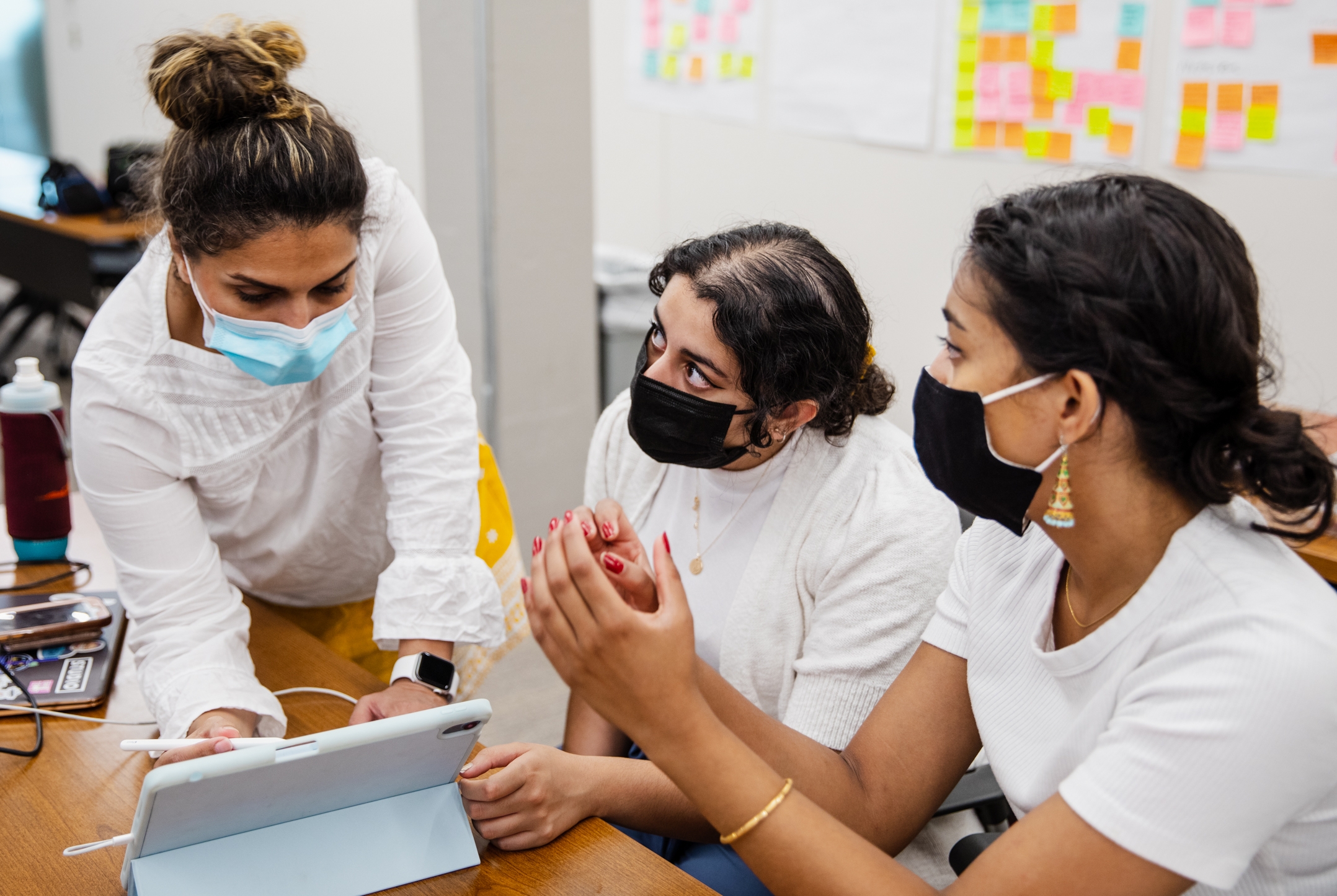Biomedical engineering and industrial design students collaborate in design sprint for health care solutions

"Fail fast. Pivot fast.”
That was a piece of early advice given to eight Virginia Tech undergraduate students who recently took part in a summer design sprint, an experiential learning opportunity where participants had just seven days to turn a novel idea into a workable prototype.
The pilot program was centered on a theme critical to the world today: solving complex problems in health care settings.
Meeting the many challenges of modern health care requires collaboration from multiple fields of study. With this in mind, Elham Morshedzadeh, assistant professor in the School of Architecture + Design in the College of Architecture and Urban Studies, and Chris Arena, associate professor of biomedical engineering and mechanics in the College of Engineering, brought industrial design and biomedical engineering and mechanics students together for the unique collaboration.
The eight students – three in industrial design and five in biomedical engineering – were divided into three teams during the design sprint. Their task was to identify health care needs of young patients in clinical settings, and then design, build, and test a prototype within a week.
First, students participated in independent study during the spring 2021 semester, in preparation for their summer design sprint. During that time, students were trained on how to work in the clinical environment. They faced problems encountered in pediatric nephrology – treating children with kidney and urinary tract diseases – and were asked to brainstorm solutions for devices that could solve these issues.


With feedback from patient advocates and health care professionals along the way, students gained skills in research, integrated feedback into proposed solutions, and worked with technical systems to prepare prototypes for potential solutions in the field.
During the summer design sprint, students then had the opportunity to brainstorm innovative designs to assist with problems encountered in pediatric nephrology. After the initial brainstorming, students prototyped and tested their designs.
“The students’ passion and creativity were truly inspiring,” said Arena, director of experiential learning in biomedical engineering and mechanics. “In only five days, they were able to integrate information from the different stakeholders and come up with unique solutions to make the process of home dialysis less intimidating for patients and caretakers. Additionally, they built working prototypes that leveraged the complementary skillsets of biomedical engineers and industrial designers.”
Each student brought their own academic perspective to the group, teaching teammates while gaining new insights from others, said Morshedzadeh. This combination of interdisciplinary collaboration and access to resources resulted in novel ideas and innovative solutions.
For the testing phase, students took their designs to Carilion Clinic’s Center for Simulation, Research and Patient Safety. Sarah Henrickson Parker, a research associate professor at the Fralin Biomedical Research Institute at VTC, directs Human Factors Research at the simulation center and oversaw testing of the students' prototypes. Parker, who is also a research associate professor in the College of Science's department of psychology and the departments of surgery and basic science education at the Virginia Tech Carilion School of Medicine, also mentored students during the final testing stage.
The students had access to other mentors in related fields as well, including John Robertson, research professor in biomedical engineering and mechanics and a doctor of veterinary medicine, and Andre Muelenaer, professor of practice in biomedical engineering and mechanics and Virginia Tech Carilion School of Medicine, in addition to being a leader of TEAM Malawi, a transdisciplinary collaboration based on a community wellness model of health. Students were also mentored by health care professionals that work with home hemodialysis at Valley Nephrology Associates. The mentors’ diverse backgrounds provided perspectives students could apply.

Each of the three teams developed and presented a tangible product by the end of their design sprint. Moreover, the designs from each of the three teams work together, providing a holistic solution to hemodialysis problems for patients, said Arena.
“This pilot program created an exceptional opportunity for students,” added Morshedzadeh. “They learned skills – such as interdisciplinary team work and community engagement – that most learn in the years after graduating. We continue to seek out opportunities to work together, from our initial NIH grant, because the experience is so great for students and it gives back to society. It’s a win-win.”
Collaborations between industrial design and biomedical engineering and mechanics have been ongoing at Virginia Tech, providing multiple experiences for students to reframe problems as opportunities. One such collaboration began in 2018, when Arena and Morshedzadeh received a National Institutes of Health grant, alongside Pamela VandeVord, the N. Waldo Harrison professor in biomedical engineering and mechanics.

With the NIH grant funds, the researchers created a new course for Virginia Tech students in which they would design a device, application, or system to address unmet health care needs of wounded veterans. The project was similar to this summer's design sprint in that students identified problems, created a design to address a problem frequently encountered, and prototyped their design.
The course was disrupted by the pandemic during the spring 2020 semester. Students persevered, however, and were able to present their prototypes and discuss the intended outcomes in assisting wounded veterans, though they were not able to travel and work with wounded veterans for the final testing of their designs.
Last year, Morshedzadeh was also one of the principal investigators for a transdisciplinary research team working on a project to increase health care access to vulnerable populations in rural, underserved communities.
“These types of ongoing collaborations between two programs and experts in the community prepare students for future career opportunities,” said Morshedzadeh. “These simulative and immersive experiences push students to learn unique skills as well, such as community-based participatory research and design and developing compassion. We hope that building on these critical skills will help them qualify for joining the interdisciplinary health care professional workforce.”
The design sprint would not have been possible without the resources available to Virginia Tech students, said Arena. This project involved resources from JLabs, a Johnson & Johnson startup incubator in Washington, D.C., as well as Carilion Clinic and the Fralin Biomedical Research Institute in Roanoke. At JLabs, students toured the lab as they brainstormed their solutions and thought about resource availability, mapped out the challenges they identified, and spoke with health care professionals for feedback on their ideas.
Morshedzadeh and Arena partnered with Claudia Rodriguez-McGill, co-lead of the industry partners program in biomedical engineering and mechanics, to provide the program’s interdisciplinary experiential learning opportunities to students. Rodriguez-McGill connected the team to industry partners - in this case, JLabs.
“We are so grateful to the different academic, health care, and business professionals that offered support during this hands-on learning opportunity,” Arena said.
Written by Laura McWhinney and Phillip Miskovic




